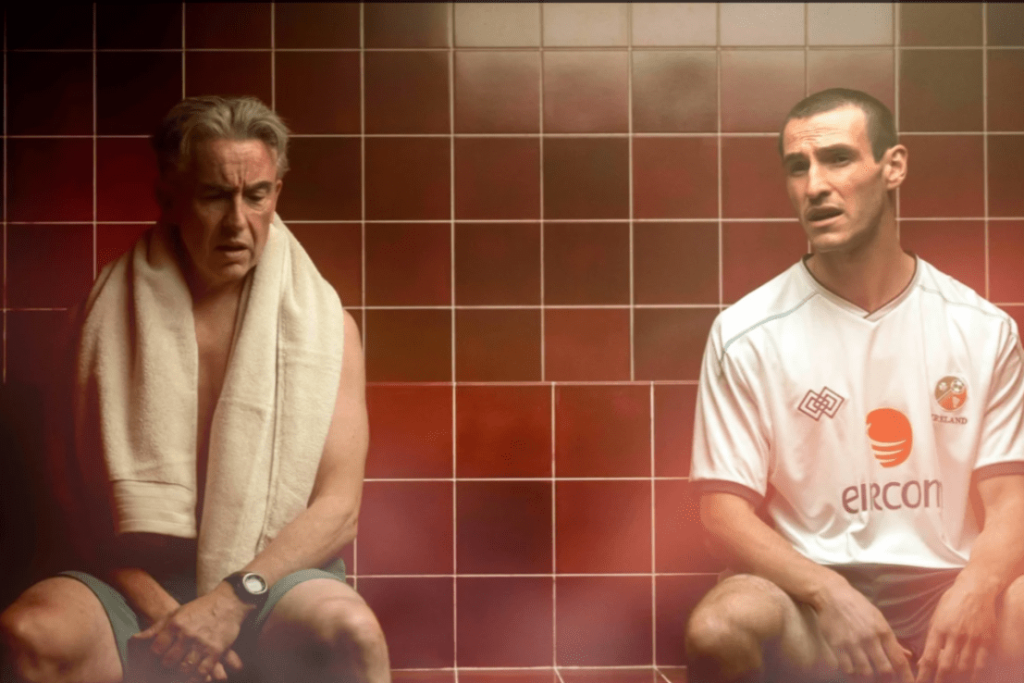
A Forgotten World Cup Clash Reimagined
Saipan plunges us into one of football’s most notorious off-pitch dramas: the explosive fallout between Republic of Ireland manager Mick McCarthy and captain Roy Keane just two weeks before the 2002 World Cup kicked off in Japan and South Korea. Rather than offering a conventional sports biopic, directors Glenn Leyburn and Lisa Barros D’Sa shift the focus inward, exploring the raw emotions and psychological toll of two strong personalities trapped together on the Pacific island of Saipan.
Stifling Conditions Fuel Rising Tension
The film wastes no time establishing its cramped, oppressive setting. Keane (Éanna Hardwicke) and McCarthy (Steve Coogan) arrive anticipating top-class training facilities, only to find a dilapidated hotel with no air conditioning, bland institutional meals, and no footballs to kick around. This threadbare environment becomes a pressure cooker for anguish and resentment. Close-up shots of peeling paint, flickering fluorescent lights, and half-empty water jugs accentuate a sense of abandonment and stress.
Magnetic Performances at the Core
Steve Coogan delivers a layered portrayal of McCarthy, revealing a man torn between steady leadership and simmering self-doubt. His laconic delivery and stormy gaze capture a manager burdened by high expectations yet determined to maintain authority. Counterbalancing him, Éanna Hardwicke’s portrayal of Roy Keane is visceral and haunting. One moment, Keane moves like a coiled spring ready to explode; the next, he retreats into brooding silence, the weight of his own perfectionism crushing him. Their scenes together crackle with electric tension, making every exchanged glance and clipped line feel momentous.
Visual Metaphors and Mesmeric Sound
Cinematographer Piers McGhee embeds powerful visual metaphors throughout the film. In one arresting scene, Keane sits in an ornate rattan chair, his silhouette backlit by the Pacific horizon as two lizards spar on the balcony—a pointed reflection of the manager-captain conflict. The hotel’s crumbling décor becomes a mirror of fractured relationships. Complementing these images, David Holmes’ score blends slow-building rhythms and ethereal synth textures, underlining Keane’s isolation and the film’s oscillation between quiet reflection and explosive confrontation.
Moments of Escapist Contrast
Between the emotionally charged confrontations, Saipan intersperses shots of the Irish squad on banana boats, dancing salsa, and laughing in the hotel’s overgrown gardens. These fleeting glimpses of camaraderie highlight the contrast between collective joy and individual despair. While the team basks in shared experiences, Keane remains locked in his room, a study in loneliness and inner conflict. This duality underscores the film’s exploration of how success and morale depend on both personal resilience and group unity.
Beyond Football: A Universal Human Drama
Although rooted in a specific sporting event, Saipan transcends genre. The film probes themes of pride, mental health, and the corrosive nature of unmet expectations. Viewers unfamiliar with the 2002 World Cup saga will still connect with its core narrative: two driven individuals pushed to their emotional limits. The dialogue, stripped of technical football jargon, emphasizes universal struggles—authority versus rebellion, vulnerability versus stoic resolve.
Pacing and Structure
Saipan unfolds over a compact runtime, yet it never feels hurried. The script balances stand-offish interrogations with tender, introspective moments. Leyburn and Barros D’Sa resist the temptation to over-dramatize every confrontation, allowing pauses and pregnant silences to speak volumes. This approach demands patience but rewards with a more immersive, contemplative experience.
Premiere and Early Acclaim
Premiering at the London Film Festival, Saipan has already garnered praise for its bold storytelling and commanding cast. Critics note its ability to captivate both sports enthusiasts and general audiences. With a four-star rating from City A.M., the film’s reception indicates that its appeal stretches far beyond die-hard football fans.
Why You Should Watch Saipan
- A riveting study of conflict, placing character psychology above match highlights.
- Two powerhouse performances that elevate the source material.
- Striking visual metaphors and a haunting, immersive score.
- Insights into leadership, pride, and the human cost of high-stakes ambition.
- Accessibility for viewers with little to no football background.
For those seeking more than a conventional sports film, Saipan offers a deeply affecting exploration of personality clashes and the burdens of expectation. Its atmospheric direction and intense lead performances ensure it stands out as one of this year’s most compelling character dramas.





